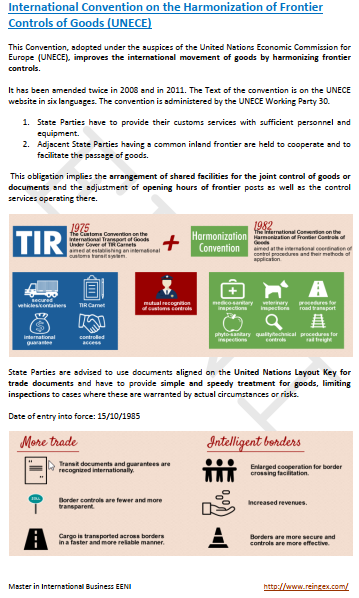Economic Commission for Europe (UNECE)
European economic integration (Economic Commission for Europe)

In 1947, ECOSOC (United Nations) created the UN Economic Commission for Europe (UNECE) with the objective of promoting pan-European Economy and Trade integration.
- Introduction to the UN Economic Commission for Europe (UNECE)
- Economic Cooperation in Europe
- Committee on International Trade of the Economic Commission for Europe
- Integration Division of the Economic Commission for Europe
- European Transport Corridors
- Convention Harmonization of Frontier Controls of Goods
Sample:
The objectives of the subject “United Nations Economic Commission for Europe (UNECE)” are:
- To understand the purposes, functions, and institutions of the UN Economic Commission for Europe (UNECE)
- To analyze its role in cooperation, economic integration, and transport
- To know how to use the socio-economic information provided by the UNECE

The Subject “Economic Commission for Europe (UNECE)” is included within the curriculum of the following academic programs at EENI Global Business School:

Masters: International Business, Foreign Trade.

Languages:  or
or  Comisión Económica para Europa (CEPE)
Comisión Económica para Europa (CEPE)  Commission économique pour l’Europe
Commission économique pour l’Europe  Comissão Económica para a Europa (UNECE).
Comissão Económica para a Europa (UNECE).
- Subject Credits “United Nations Economic Commission for Europe”: 1

Economic Commission for Europe (UNECE).
- The Economic Commission for Europe (UNECE) consists of fifty-six countries and is one of the five regional commissions of the UN (*)
- The Committee on International Trade of the Economic Commission for Europe (UNECE) works on developing closer economic relationships among the member economies
- The Economic Commission for Europe region covers 47 million km² and has the 20% of the world's population
Member States of the Economic Commission for Europe (UNECE): Albania, Andorra, Armenia, Austria, Azerbaijan, Belarus, Belgium, Bosnia and Herzegovina, Bulgaria, Canada, Croatia, Cyprus, Czech Republic, Denmark, Estonia, Finland, France, Georgia, Germany, Greece, Hungary, Iceland, Ireland, Israel, Italy, Kazakhstan, Kyrgyz Republic, Latvia, Liechtenstein, Lithuania, Luxembourg, Macedonia, Malta, Moldova, Monaco, Montenegro, Netherlands, Norway, Poland, Portugal, Romania, Russia, San Marino, Serbia, Slovakia, Slovenia, Spain, Sweden, Switzerland, Tajikistan, Turkey, Turkmenistan, Ukraine, UK, U.S., Uzbekistan.
(*) Others regional commissions of the UN are the:
- Economic Commission for Asia (ESCAP)
- Economic Commission for Latin America (ECLAC)
- Economic Commission for Africa
- Economic Commission for Western Asia (ESCWA)

The Economic Commission for Europe is an Strategic partners of the Intergovernmental Organization for International Carriage by Rail (OTIF).
The Economic Commission for Europe (ECE) belongs to the European Economic Area of Western Civilization.
- Combined Transport and the Economic Commission for Europe
- Trade Facilitation - Trade Facilitation Agreement
- Kyoto Convention (Containers)
The International Bureau of Containers and Intermodal Transport (BIC) is an observer member at the Economic Commission for Europe (UNECE).

Trans-European Transport Corridors.
- Atlantic Logistics Corridor
- Baltic-Adriatic Logistics Corridor
- North Sea-Baltic Logistics Corridor
- North Sea-Mediterranean Logistics Corridor
- Pan-European Transport Corridor II
- Pan-European Transport Corridor IX
- Europe-Caucasus-Asia Logistics Corridor
- Afghanistan-Turkey Logistics Corridor
- Islamabad-Istanbul Logistics Corridor
- Trans-Caspian Logistics Corridor
(c) EENI Global Business School (1995-2025)
Top of this page










 WhatsApp
WhatsApp